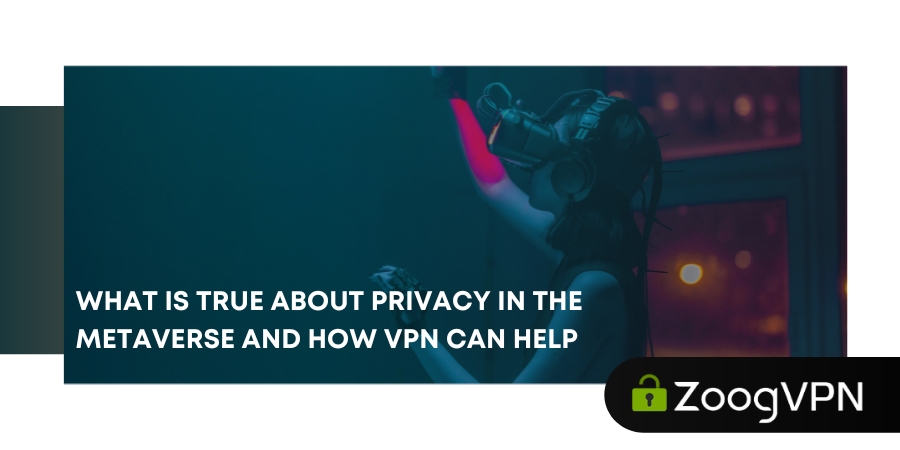The metaverse represents the next stage of the internet, merging virtual reality, augmented reality, and blockchain technology to create interconnected, immersive digital environments. It is a shared, virtual space where users can interact, work, play, and socialize via digital avatars, typically in real time. This futuristic concept, once a concept of science fiction, is now absolutely real and formed with platforms like Meta’s Horizon Worlds, Decentraland, and VRChat leading the charge.
With the ongoing integration of the digital world into the real one, the significance of privacy should be put first. Today, personal data is a valuable commodity, and every mindful user should care about personal security. The metaverse, with its potential for extensive data assembly and user tracking, comes with a vital privacy challenge. Users need to be aware of how their data is being used and take proactive measures to protect their digital identities.
Let’s discover how to dive into the innovative world of the metaverse while still taking care of your privacy and security, as well as the best strategies to do so.
Understanding the Metaverse
The metaverse is a collective, virtual shared space, created by the convergence of virtually enhanced physical reality and physically persistent virtual reality. It encompasses a vast, interconnected network of 3D virtual worlds where users can interact in real-time through digital avatars. This concept exceeds traditional internet experiences by offering immersive, interactive environments that blur the lines between the physical and digital realms.
Key features and technologies powering the metaverse
The metaverse is powered by the advanced technologies, like:
- Virtual Reality (VR). VR provides fully immersive digital experiences where users can explore and interact with 3D environments through VR headsets and controllers. This technology creates a sense of presence, delivering a feeling as if users are truly inside the virtual world.
- Augmented Reality (AR). AR overlays digital content onto the physical world, enhancing real-world experiences with interactive digital elements. It is often accessed through smartphones, tablets, or AR glasses, providing a smooth transition between digital and physical interactions.
- Blockchain. Blockchain technology underpins the decentralized nature of many metaverse platforms. Security, transparency, and immutability of transactions are the key characteristics of this technology, enabling the creation and ownership of digital assets like virtual real estate, NFTs (non-fungible tokens), and in-game currencies.
- Artificial Intelligence (AI). Currently, booming AI technology drives the intelligent behaviors of virtual entities and environments within the metaverse. It introduces features such as natural language processing, realistic animations, and personalized user experiences, enhancing the overall interactivity and realism of the virtual world.

Current and potential future applications of the metaverse
There are a range of directions where the metaverse develops. It equips users with immense capabilities across many activities.
Social Interactions
The metaverse offers new ways to connect and socialize. Platforms like VRChat and Meta’s Horizon Worlds allow users to meet, interact, and build relationships in immersive virtual environments, even through geographical boundaries.
Gaming
The gaming industry is one of the core elements where the metaverse develops the most. You may already be acquainted with games like Fortnite and Roblox that provide expansive virtual worlds where players can dive into diverse activities, from battling to building communities and creating rich, interactive gaming experiences.
Virtual commerce
The metaverse has brought some drastic changes in commerce as well. Virtual marketplaces and blockchain-powered transactions allow users to buy, sell, and trade digital assets, covering virtual real estate, clothing for avatars, and unique NFTs, creating a new digital economy.
Education
Innovative educational opportunities within the metaverse have delivered virtual classrooms and training simulations, offering immersive and interactive learning experiences. Students can explore historical sites, conduct virtual science experiments, and collaborate on projects in ways traditional classrooms cannot match.
Exploring the Unprecedented Privacy Risks of the Metaverse
Undoubtedly, the metaverse ensures a diversity of opportunities and experiences. Nevertheless, such a broad variety of opportunities raises significant concerns about data privacy in the metaverse due to its extensive data collection and tracking capabilities. When immersing themselves in the digital world, users generate loads and loads of data, which can be comprehensively tracked and investigated by platform providers and third parties.
Data collection and tracking in the metaverse
In terms of the sophisticated metaverse network, there are several types of data assembly.
- Personal information. User profiles often require personal details such as name, age, email address, and location. This information helps create a personalized experience but also delivers risks if not adequately protected.
- Behavioral data. Platforms track user interactions, preferences, movements, and engagement patterns. It is valuable for tailoring experiences and advertising but can also be exploited if mishandled.
- Biometric data. VR and AR devices can collect biometric data, covering eye movement, facial expressions, and physical gestures. Such data elevates the immersive experience but is pretty sensitive, coming with significant privacy concerns in case it falls into the wrong hands.
Risks associated with data breaches and unauthorized access
The extensive data collection in the metaverse intensifies the potential data breaches and unauthorized access. Breaches can result in the exposure of personal, behavioral, and biometric data, leading to severe consequences for users. Let’s take a look at the most popular data reaches in the metaverse.
- Identity theft. Stolen personal information can be leveraged to impersonate users, resulting in financial fraud and other malicious activities.
- Surveillance. Constant tracking and data collection can result in an environment of all-around surveillance, destabilizing user autonomy and privacy.
- Misuse of data. Behavioral and biometric data can be used for manipulative purposes, such as targeted advertising, profiling, and other exploitative practices.
Instances of privacy breaches in the metaverse are already emerging. For example, platforms like Facebook (Meta) have faced scrutiny over their data practices, raising concerns about how user data is handled and protected. Moreover, the potential for unauthorized access to VR environments and personal spaces within the metaverse highlights the need for robust privacy protections.

Implications of Inadequate Privacy Protections
Inadequate privacy protections in the metaverse can have far-reaching implications. Without proper safeguards, users may fall victim to identity theft, intrusive surveillance, and data misuse. The lack of clear privacy regulations and user data rights further exacerbates these issues, leaving users vulnerable to exploitation.
Key metaverse privacy issues to keep in mind
These privacy concerns are the integral obstacle to creating a safe and trustworthy metaverse, where users can engage freely without compromising their personal information and privacy.
- Lack of privacy regulations. The metaverse operates in a regulatory gray area, with existing privacy laws often not directly applicable to virtual environments. A lack of clarity can result in insufficient protections for user data.
- Intrusive and extensive data collection. The immersive concept of the metaverse requires the collection of vast amounts of data, bringing in concerns about how this data is used and protected.
- Users’ data rights and ownership. Determining who owns and controls the data generated in the metaverse is crucial. Users need clear rights to their data and transparency about how it is used.
- Interpreting current regulations in the metaverse world. Existing privacy laws need to be modified and adapted to cater to the unique challenges of the metaverse, guaranteeing comprehensive protection for users.
- User-to-user privacy. Interactions between users in the metaverse can also pose privacy risks. Protecting against harassment, stalking, and other privacy invasions is essential.
- Minors’ privacy concerns. Currently, there are no age restrictions in metaverse. Ensuring the safety and privacy of kids in the metaverse is critical, requiring stringent measures to protect their data and interactions.
Role of VPN in Enhancing Privacy
A VPN (Virtual Private Network) is crucial for enhancing privacy in the metaverse by encrypting data and hiding users’ IP addresses, thus ensuring secure virtual experiences. In the metaverse, a VPN provides secure and private internet connections within virtual worlds, protecting user data from cyber threats and enabling access to geographically restricted content. Specifically, a VPN enhances privacy by securing connections on public Wi-Fi, handling censorship, and masking digital footprints, making interactions within the metaverse more secure and private.
Encrypting data to protect against leaks
In the metaverse, data exchange is constant and extensive, which makes VPNs integral in protecting user privacy by encrypting data transmitted between a user’s device and the metaverse platform. Ciphering safeguards against unauthorized access and leaks, ensuring that sensitive information—such as personal details, behavioral data, and biometric information—remains secure. This is critical as in fact, in 2023, there were 3,205 instances of data breaches, affecting a total of 353 million individuals. By preventing data hacks, VPNs help maintain the privacy and integrity of user interactions within the immersive virtual environment of the metaverse.
Hiding IP addresses to prevent tracking
A primary function of a VPN is to conceal a user’s real IP address, substituting it with one from the VPN server. In the context of the metaverse, this is particularly crucial as it prevents virtual platforms from tracking a user’s interactions, movements, and activities. By using a VPN, users can maintain their anonymity within virtual worlds, making it difficult for websites, advertisers, and metaverse entities to build detailed profiles based on their behaviors and locations. This enhances privacy and security, allowing users to explore and interact in the metaverse without the concern of being constantly monitored and profiled.
For instance, in virtual environments, digital interactions are increasingly booming, so many users opt for the VPN for managing IP addresses for platforms. This is especially relevant for decentralized platforms like Binance and blockchain networks become pivotal. Tools such as decentralized VPNs (dVPNs) leverage blockchain to distribute IP addresses across a network of nodes, ensuring anonymity without a central authority. Decentralization makes it challenging for entities like Binance to trace users’ original IPs within virtual realms. Users connect to dVPNs, which mask their real IP addresses with those of participating nodes, safeguarding their privacy in the metaverse.
Additionally, traditional VPNs encrypt users’ internet traffic and route it through remote servers, effectively concealing IP addresses from ISPs, and governments, which is relevant for demanded platforms like Binance. Users are provided with secure access to financial platforms, avoiding potential IP tracking and logging in virtual environments. Blockchain-based tools further enhance security by managing IP blacklists through smart contracts or decentralized databases. Thus, platforms like Binance maintain integrity and security within the metaverse, preventing unauthorized activities and safeguarding digital interactions.
Accessing geo-restricted content
In the metaverse, content and experiences can be geographically restricted due to licensing agreements or local regulations. By using a VPN, users can connect to servers in different locations, effectively bypassing these restrictions and accessing a wider array of virtual content. This capability significantly enhances the metaverse experience, allowing users to enjoy unrestricted access to the global offerings of this expansive digital universe.
What are the use cases of the VPN in Metaverse?
The use of a VPN should become a fundamental tool for enhancing privacy in the metaverse. With data ciphering, IP addresses hiding, and accessing restricted content, VPNs ensure a powerful layer of protection against the variety of privacy risks inherent in these digital environments. The metaverse is currently in the state of progress and expansion, so leveraging VPN technology will remain relevant for maintaining secure and private user experiences. Beyond encryption and anonymity, VPNs offer several additional benefits that enhance privacy in the metaverse.
- Secure virtual meetings and conferences. A VPN ensures that sensitive business meetings and conferences held in the metaverse remain confidential by encrypting the data transmission. Users can also restrict access to virtual meeting spaces based on geographic locations, enhancing security.
- Enhanced online gaming experience. By improving connection stability and reducing lag through the avoidance of ISP throttling, a qualitative VPN service ensures a smoother gaming experience. Besides, a VPN allows you to connect to game servers in different regions, granting access to exclusive content and enabling you to play with international friends.
- Remote work. In remote work and collaboration within the metaverse, a VPN provides secure data transfer and enables access without geographic restrictions. It encrypts all communications in virtual workspaces, safeguarding sensitive corporate data. Remote employees can connect to the metaverse from anywhere in the world, handling local internet restrictions effortlessly.
- Virtual shopping and transactions. Secure payments and well-protected personal data during transactions are integral benefits brought by VPN. Moreover, with access to global markets and virtual stores that may be restricted based on your geographic location, users can get a broader and more inclusive shopping experience.
- Educational activities. Students and educators can greatly benefit from VPN and access educational content and virtual classrooms without geographical limitations. Furthermore, personal and academic information shared in virtual learning environments stays encrypted and secure.
VPN Features Critical for the Metaverse
Metaverse continues its growth in sophistication, complexity, and user engagement. Due to this fact, the choice of a VPN with specific features is essential to ensure a secure, private, and seamless experience. Here are the critical VPN features necessary for diving into the metaverse effectively.
High-speed connections for seamless VR/AR experiences
Captivating VR and AR experiences demands high-speed internet connections. Latency and buffering can significantly detract from the user experience, making high-speed VPN connections a top priority.
- Bandwidth and server load management. A VPN with solid bandwidth and efficient server load management ensures that users experience minimal latency and uninterrupted interactions in the metaverse.
- Geographically diverse servers. Having access to a wide range of server locations helps maintain high speeds, as users can connect to servers closer to their physical location, reducing ping times and improving overall performance. For instance, ZoogVPN is a trusted vendor offering 100+ locations to make your metaverse experience fascinating.
Strong encryption protocols
Encryption is a fundamental aspect of VPN security, and strong encryption protocols are vital for protecting data within the metaverse.
- Advanced Encryption Standard (AES). VPNs using AES-256 encryption provide a high level of security, ensuring that all data transmitted between the user and the metaverse platform remains confidential.
- Secure protocols. VPNs that support innovative protocols and state-of-the-art configurations offer solid protection against cyber threats. These time-tested protocols provide strong encryption, reliable performance, and resistance to known vulnerabilities.
No-logs policies to ensure data privacy
A VPN with a strict no-logs policy ensures that user data is not recorded or stored by the vendor, securing your metaverse experience.
- Transparency and audits. VPN providers with transparent privacy policies and third-party audits can be trusted to execute their no-logs commitments, giving users confidence that their activities are not being tracked or logged.
- Jurisdiction. Choosing a VPN based in a privacy-friendly jurisdiction, outside the reach of major surveillance alliances (like the Five Eyes), provides more guarantee that user data remains protected from government intrusion.
Compatibility with various devices and platforms used in the metaverse
The metaverse can be accessed through various devices, comprising VR headsets, AR glasses, PCs, and mobile devices. A VPN that offers broad compatibility is more likely to provide seamless integration across all these platforms, respectively.
- Multi-device support. VPNs that support multiple simultaneous connections allow you to secure all your devices with a single subscription, enhancing convenience and security.
- Platform compatibility. Ensuring the VPN works with popular operating systems (Windows, macOS, Linux, iOS, Android) and VR platforms (Oculus, HTC Vive) is essential to secure the devices you have.
Split tunneling for selective privacy control
Split tunneling is a feature that allows users to route some of their traffic via the VPN while allowing other traffic access to the internet directly. With this function, you gain a selective privacy control that can be particularly valuable in the metaverse, let’s see why.
- Optimized performance. The adoption of split tunneling lets you direct only the traffic you want to protect through the VPN, which substantially optimizes performance and reduces latency for non-sensitive applications.
- Customized privacy. Users can tailor their privacy settings to adhere to their requirements so that their sensitive activities within the metaverse are protected while maintaining direct access for less critical tasks.
Additional features for enhanced security and privacy
Beyond the core features, some additional VPN capabilities can further enhance the metaverse experience:
- Kill Switch. A kill switch feature ensures that if the VPN connection drops, the user’s internet connection is immediately cut off, preventing any unprotected data from being transmitted.
- DNS Leak Protection: This prevents DNS queries from being exposed, ensuring that all user requests are routed securely through the VPN.
Considering these features, we highly suggest going for a VPN equipped with high-speed connections, strong encryption protocols, a strict no-logs policy, broad compatibility, and split tunneling. With a trusted vendor, you can obtain a fully-fledged tool with the essential features for enhancing privacy and security in the metaverse. Sign up for the reliable VPN service now to maintain a secure, private, and seamless virtual experience.
ZoogVPN is a recommended solution for Metaverse users
In terms of the indicators we’ve just gone through, ZoogVPN is a highly recommended option for metaverse users due to its strong dedication to privacy and security. It is trusted by users for its no-logs policy and a robust set of robust security features, ensuring that user data remains confidential. With servers in over 100 locations, ZoogVPN provides excellent coverage and connectivity, which is essential for a seamless metaverse experience.
The platform also ensures a user-friendly interface, making the navigation and setup process simple even for non-tech users. The intuitiveness and user-centricity of ZoogVPN is complemented by responsive customer support, ready to handle any of your concerns promptly. ZoogVPN also offers competitive pricing with great value for money, especially for long-term plans, making it an affordable and reliable choice for many users.
Other considerations
- Performance testing. Before committing to a subscription, consider taking advantage of free trials or money-back guarantees to test the VPN’s performance in the metaverse.
- Special features. Look for additional features such as split tunneling, a kill switch, and DNS leak protection that enhance security and privacy.
Conclusion
With the constant activity of malicious actors, you should take care of your security when diving into the metaverse. The immersive and interactive platform sharpens the risks related to data extraction and breaches, so don’t neglect caring over the robust privacy. VPN is your devoted solution that safeguards user privacy by encrypting data, masking IP addresses, and providing secure access to geo-restricted content.
To stay safe and private in the metaverse, you should adopt a multi-faceted approach, and make VPN usage integral, while also employing strong passwords, enabling two-factor authentication, keeping software updated, being cautious with personal information, and adjusting privacy settings within platforms. By combining these strategies, you can enjoy the metaverse securely, protecting your digital identities and personal information from potential threats. Opt for the credible ZoogVPN service today and secure your metaverse experiences.




























